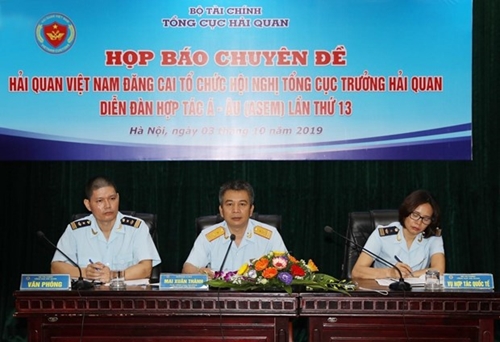The event, the first of its kind hosted by the General Department of Vietnam Customs (GDVC), brought together 53 delegations from customs agencies of member countries of the Asia-Europe Meeting (ASEM), the Secretary General of the World Customs Organization (WCO), the European Union (EU) and embassies of ASEM member countries in Vietnam.
In his opening remarks, Vietnamese Deputy Minister of Finance Do Hoang Anh Tuan said the meeting offers an opportunity for the delegates to seek ways to revamp customs management, meeting requirements of the Fourth Industrial Revolution, while stepping up cooperation in human resource development and sustainable development of the sector.
    |
 |
|
Deputy General Director of the General Department of Vietnam Customs Mai Xuan Thanh (C) at the press briefing |
Nguyen Van Can, head of the GDVC, said hosting the meeting demonstrates the GDVC’s efforts in contributing to orienting ASEM customs cooperation amidst the Fourth Industrial Revolution and challenges facing the world like trade fraud, terrorism and smuggling, among others.
During the previous meeting in Germany in 2017, ASEM customs directors-general approved four priorities of customs cooperation in the 2018-2019 period, namely trade facilitation and supply chain security, fight against counterfeit goods and enforcement of intellectual property rights, social and environmental protection, and community connectivity and ASEM vision.
These priorities have been the focus of ASEM customs collaboration since 2009, and will continue to be tabled at this meeting, Can said, adding that the meeting aims to agree upon specific plans of actions on the four priorities, which will be included in the ASEM customs action plan for 2020-2021.
One of the major topics of the event will be the fight against scrap and waste, he said, adding that the GDVC has suggested discussions on the green customs campaign.
The 2020-2021 ASEM customs action plan is expected to cover eight goals, which are facilitating trade and online customs procedures, implementing the one-stop-shop mechanism, effectively managing the customs sector through high technology, promoting the green customs campaign to prevent the illegal transportation of scrap and waste, strengthening customs coordination to prevent counterfeit goods, enforcing intellectual property rights at border areas, connecting ASEM through information sharing, and promoting ASEM cooperation in transit operations and customs management over e-commerce.
ASEM is an intergovernmental process established in 1996 to foster dialogue and cooperation between Asia and Europe. Presently it comprises 53 partners: 30 European and 21 Asian countries, the European Union and the ASEAN Secretariat. ASEM addresses political, economic, financial, social, cultural, and educational issues of common interest in a spirit of mutual respect and equal partnership.
Source: VNA